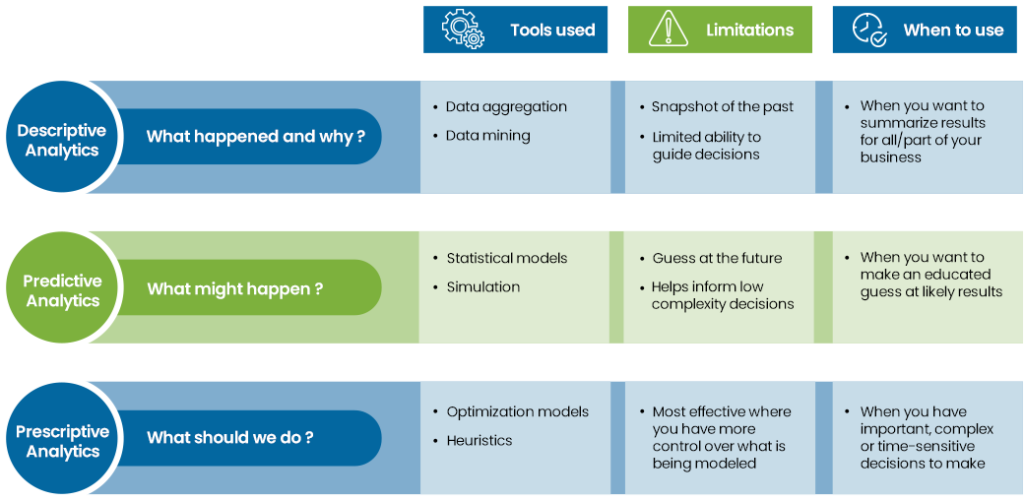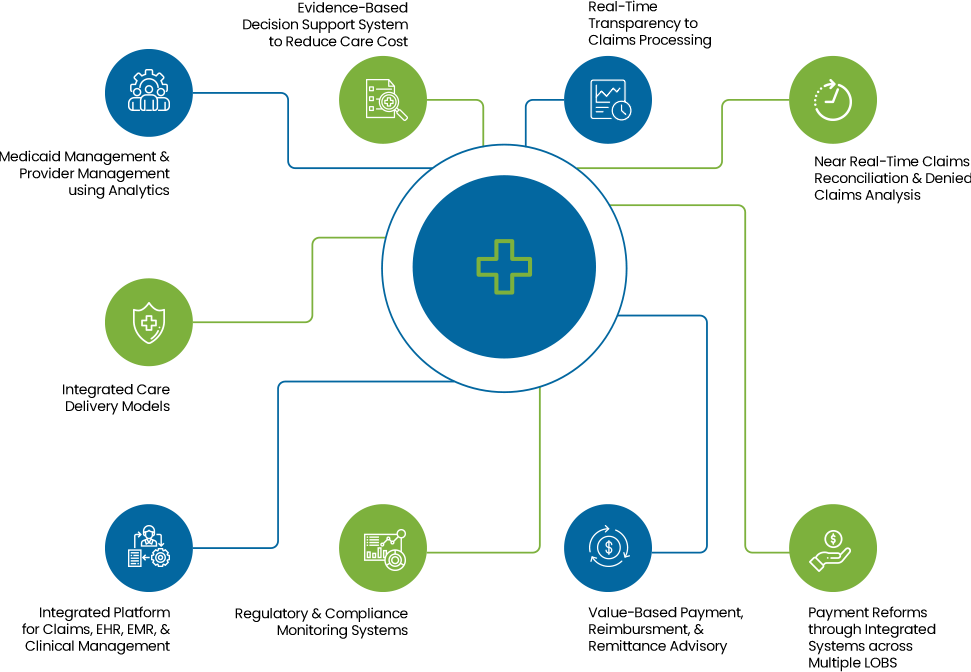Healthcare systems around the globe have seen a shift from a traditional fee-for-service model to a more patient-centric approach for better patient healthcare outcomes, with the Value-Based Healthcare (VBHC) model. This patient outcome-driven model aims to prioritize healthcare quality, as payers reimburse them based on the value and outcomes of that care provided. Payers establish quality measures and goals that providers must meet to receive full reimbursement; otherwise not coming up to the mark results in costly penalties.
In this blog, we’ll explore the role of advanced analytics in a value-based healthcare model and how it supports improved patient outcomes and with cost management strategies. We will also overlook the challenges and benefits of incorporating advanced analytics into healthcare delivery, with some real-world examples of how they are already making a difference.
What is Value-Based Analytics?
Value-based analytics refers to the use of advanced technologies, such as machine learning, artificial intelligence (AI), and data mining, to assess and manage risks. By analyzing large datasets, these tools provide actionable insights that help improve healthcare delivery, optimize patient outcomes, with quality and affordability.
Unlike traditional data analysis, which often focuses on descriptive statistics and historical data only, advanced analytics use complex algorithm methods to predict future events and outcomes, problem-solving recommendation, and find patterns that aren’t immediately obvious.
In healthcare, advanced analytics involves analyzing vast amounts of patient data (clinical, demographic, behavioral, etc.) with:
- Predictive Analytics: Identifying patients who are at risk for developing chronic conditions or being readmitted to the hospital.
- Prescriptive Analytics: Recommending targeted interventions or care plans based on patient health data and characteristics.
- Descriptive Analytics: Analyzing and reporting key performance indicators (KPIs) to provide insights into patient care outcomes and associated costs.

How Advanced Analytics Supports Value-Based Healthcare
- Improve Patient Health Outcomes
Advanced analytics models can significantly improve patient outcomes by predicting health risks, identifying potential complications, and aiming to prevent future problems. Predictive models, for example, can identify patients who are at high risk for chronic conditions, readmissions, or adverse events based on historical data. Healthcare providers can then avoid these earlier interventions with customized care plans to prevent these negative outcomes, improving overall health and quality of life.
Additionally, analytics tools can monitor patients in real time, alerting clinicians to changes in a patient’s condition. This data-driven approach allows for timely adjustments to care plans, ensuring that patients receive the most appropriate care at the right time.
- Optimizing Healthcare Costs:
One of the primary goals of value-based healthcare is to reduce the overall cost of care while maintaining or improving outcomes. Advanced analytics supports cost management by identifying inefficiencies, such as unnecessary tests or clinical procedures, and helping healthcare organizations to optimize their revenue cycle.
Predictive analytics can also predict patient needs and prevent hospital readmissions, which can be a significant cost burden for both patients and healthcare systems. By analyzing patterns in patient behavior and treatment outcomes, value-based analytics tools can identify which models are most effective and cost-efficient, helping providers deliver better care at lower costs.
- Customized Care Plans:
Every patient is unique, and what works for one person may not work for another. Advanced analytics enables healthcare providers to personalize treatment plans based on individual patient data and history. By combining clinical data with demographic and lifestyle information, prescriptive analytics tools can help clinicians create customized care plans that can be specific to their health concerns, leading to more effective treatments and improved outcomes.
This personalized approach also aligns with the value-based care model by ensuring that treatments are both necessary and appropriate, avoiding over-treatment and reducing the risk of harm from unnecessary procedures.
- Data-Driven Decision-Making:
In a value-based healthcare system, providers are often required to make complex decisions based on a wide range of factors, from patient history to the latest research. Descriptive analytics can support informed medical decisions by providing evidence-based insights, helping the healthcare providers to make more appropriate data-driven choices.
AI-powered decision support tools can also suggest the most effective treatments based on patient data, while machine learning algorithms can identify patterns in patient health that may not be immediately obvious. This enables clinicians to make more accurate and timely decisions, ultimately leading to better patient outcomes
- Measuring Care Value:
In a value-based healthcare system, success is measured not by the number of services provided but by the patient satisfaction outcomes achieved. Advanced analytics can help healthcare organizations measure and track the true value of care by assessing the relationship between patient outcomes and the costs of care. By measuring both quality and cost, descriptive analytics helps organizations identify which practices deliver the best value to patients.
Case Studies and Examples:
Real-world applications of advanced analytics in value-based healthcare are already showing impressive results. Such as:
- Predicting Hospital Readmissions:
Many hospitals use predictive analytics to identify patients at risk of readmission within 30 days of discharge. For example, some hospitals have successfully implemented machine learning models that analyze patient data, such as previous medical history, comorbidities, and discharge notes, to predict which patients are most likely to return. This allows healthcare providers to stay early informed with additional care or follow-up, reducing readmissions issues and improving patient outcomes.
- AI Technology in Oncology:
In oncology, AI is being used to personalize cancer treatment. By analyzing data from medical records, genetic information, and clinical trials, AI algorithms can recommend customized treatment plans tailored to individual patients. This helps oncologists choose the most effective therapies, with proper scheduling and improves the chances of successful outcomes.
- Improving Population Health Management:
Healthcare organizations are using advanced analytics to identify patterns and trends within large patient populations, enabling them to manage chronic conditions more effectively. By analyzing patient data across entire communities, providers can implement proactive care programs that target at-risk populations and reduce overall healthcare costs.

Benefits of Advanced Analytics in Value-Based Healthcare
The use of advanced analytics in value-based healthcare offers a wide range of benefits:
- For Providers: Healthcare providers can increase administrative efficiency, reduce cost, and improve patient satisfaction by delivering personalized, high-quality care.
- For Patients: Patients benefit from personalized care plans that addresses their unique health needs, leading to better outcomes and a more engaged healthcare experience.
- For Payers and Insurance Companies: Insurers can better manage risk, reduce unnecessary spending, and incentivize cost-effective care by using analytics to evaluate healthcare services’ effectiveness.
Transform your revenue cycle with smart insights
Challenges in Implementing Advanced Analytics
Despite the significant benefits, value-based analytics still faces some challenges in healthcare systems. These include:
- Patient Data Privacy and Security: Protecting patient data is critical, and healthcare organizations must ensure compliance with privacy laws and regulations like HIPAA and CMS while using advanced integrated analytics tools.
- Integration with Existing Systems: Many healthcare systems rely on outdated IT infrastructure, making it difficult to integrate advanced tools seamlessly within their existing systems.
- Training and Adoption: Healthcare providers and staff need proper training to use advanced analytics tools and models effectively. There may also be resistance to adopting new technologies, especially among healthcare physicians who are used to traditional methods of care only.
Final Thoughts
As healthcare systems continue to adopt value-based care models, the role of data and analytics will only grow. Emerging technologies like artificial intelligence, machine learning, and natural language processing will continue to improve the accuracy and effectiveness of models, decision support tools, and personalized care strategies. As these technologies evolve, we can expect to see even greater advancements in patient care and cost management, further transforming the healthcare structure. Trust MedCare MSO’s to ensure smooth transition towards value-based care analytics to improve care quality and control costs. Just contact us today and our medical billing team is here to support you on every step of the way.

